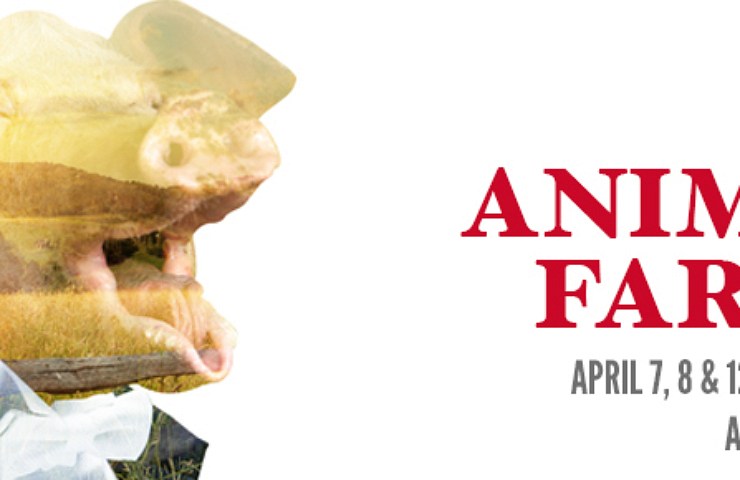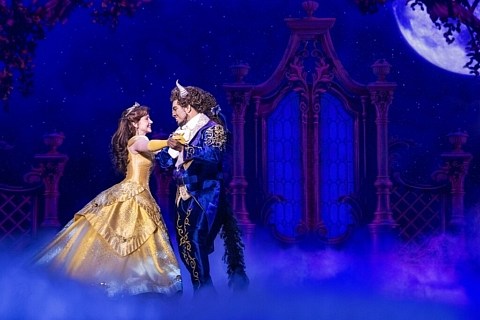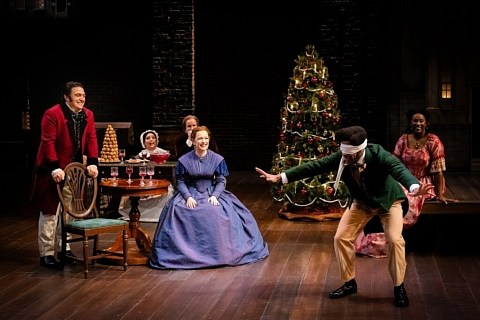NOTE: Article may contain spoilers
George Orwell’s “Animal Farm” is not one of those stories you easily forget. I read it back in 8th grade and it still makes me uncomfortable. That being said, I had high expectations for the School of Theatre and Dance’s production at the Wortham Theatre.
Though the play did have its moments that felt out of place, overall the production was surprisingly good. Going in, I had three questions in mind: what the costume design would be like, would the ending be as creepy as I remember, and would it be respectful to the source material?
I was fearful that I would not be able to suspend my disbelief, that I would only see the actors as actors rather than animals. That fear was dashed immediately. From sheep’s wearing sweaters to the all white dress and leggings of Mollie the show pony, each actor had a different costume for their respective animal. It gave a uniqueness to each portrayal.
Plus, when the revolt against the humans actually takes place, the design of the costumes makes the actors appear nightmarish, which is fitting given the situation.
The Russian Aspect
I would be remiss if I did not discuss the political aspect of the story. The metaphors for Stalinist Russia are all over the production. Not only do Mischa Aravena, Abraham Ntonya and Yao Dogbe perfectly portray the pig equivalents of Stalin, Trotsky and Lenin/Marx, but the symbolim goes further. A battle won in October, a hoof and horn flag, dogs representing the secret police, the few who get rich off of exploiting the many.
The story was almost completely accurate to the source material. I personally enjoyed how the play expands on Snowball’s, Ntonya’s character, impact on the story. An early portion of the book became the entire first half. We see how he fulfills the dream of his mentor Old Major, played by Dogbe, by earning the animals their freedom. And then we are heartbroken when Aravena as Napoleon takes control out from under him in a very not-so-subtle sort of way.
As a side note, Kelsey Busboom plays Squealer, the propagandist pig, and for some reason I thought she looked and talked a lot like Sean Spicer at times. Always showing up with a BS explanation for why things were happening.
A sorrowful lot
I really was not expecting to be emotionally moved by this show. Disturbed is one thing, but brought to tears is another. Seeing the hope that these animals have for a better world and then seeing them broken both mentally and physically by the end is heart breaking. One scene that is hard to watch is when some are forced to confess their crimes. One by one they are dragged into a circle to confess before being murdered by dogs.
Thaddeus Walker and Will Inman also deserve praise for their performances. Walker portrays Boxer the workhorse, the hardest worker and champion among the animals. He portrays Walker as having a heart of gold, but never smart enough to rise up against what is wrong. Inman plays Benjamin the donkey, the oldest and probably smartest character in the story. He adds a bit of humor to the story with his no BS attitude. However, Benjamin is never motivated enough to do anything.
Overall, the cast starts as a strongm, united group and dwindles to a broken few.
Story tweaks
The one part of the story that did catch me by surprise was that this is a musical. The production features lyrics from Adrian Mitchell and music by Richard Peaslee. I had overlooked this fact but found it actually worked to the plays advantage. Not only did it lengthen what is a very short story. But it also let the scenes develop emotionally and add a cinematic feel to the plot. It is not music you would put on your phone but in the context of the story they fit perfectly. Aravena at one point sings a song about having to survive as the runt of his litter. In my head I imagined there was a Stalinist connection somewhere.
One thing that did bug me was the addition of a farm boy who narrates the story for the audience. His presence does not help the story at any point and seems to be a theater cliche. But at the very end of the play I realized his sole purpose: to quote a line directly from the book. When the pigs and farmers hold a party together, though it is a great departure from the source material making it a disco, a stalemate comes between the pigs and the humans. The narrator then says the final lines from Orwell’s book “The animals outside looked from pig to man, and from man to pig, and from pig to man again: but already it was impossible to say which was which.”
My rating: 4/5





Recent Comments